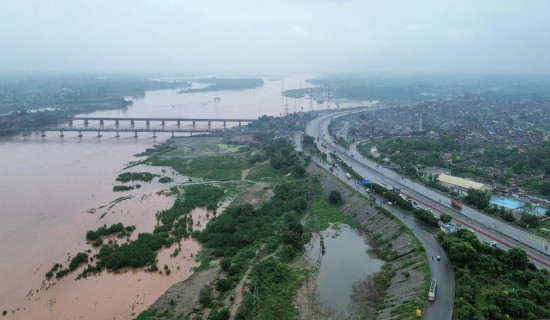- Friday, 29 August 2025
Beat Kidney Stones With Preventive Measures
Kidney stones are a growing health condition in Nepal, affecting over 1.8 million people. In most cases, patients do not realise they have kidney stones until unbearable pain forces them to seek medical treatment at the hospital. Stones are often discovered coincidentally during an examination, long after some have endured permanent kidney damage. Globally, evidence has suggested that one in every ten people will develop kidney stones during their lifetime, making it a burden for health systems.
Kidney stone formation is influenced by metabolic, lifestyle, and environmental factors. Hypertension, diabetes, and obesity alter urine chemistry, increasing calcium, uric acid, phosphate, and oxalate excretion through urine, leading to stone formation. Other metabolic conditions and insulin resistance also increase the risk. Lifestyle plays an important role – failure to drink enough water results in concentrated urine, predisposing to crystal development and stone formation.
The diet contributes significantly to the formation and prevention of kidney stones. A high sodium intake causes the body to lose more calcium in the urine, while excessive animal protein content makes the body more acidic – both tendencies are favourable for stone formation. Hereditary predisposition is also an essential factor. Occupations that subject an individual to heat exposure over time, such as truck driving or working outdoors, combined with sporadic access to restroom facilities, tend to cause dehydration, predisposing an individual.
Symptoms and diagnosis
Symptoms of kidney stones rarely appear until they begin to move in the urinary tract. This may lead to a sharp pain in the flank, stomach, or groin area. Other symptoms include haematuria (blood in urine), a strong urge to urinate, painful urination, nausea, vomiting, and fever if infection occurs. Prompt diagnosis must be made to prevent kidney injury or urinary tract infection. Diagnosis can be made with an abdominal ultrasound and a routine urine examination. Most of the time, computerised tomography (CT) is the gold standard diagnostic tool.
Prevention
Preventing kidney stones is achievable mainly through lifestyle changes. Drinking 2.5 to 3 litres of fluid daily helps maintain dilute, pale-coloured urine—an indicator of good hydration. Reducing salt and animal protein intake supports kidney health. Individuals with high fluid loss due to heat exposure or exercise should increase fluid intake accordingly. Prevention is also facilitated by restricting the consumption of sugary and carbonated drinks. On the other hand, moderate milk consumption can be helpful because calcium in milk chelates with oxalate in the intestines, reducing its absorption.
Citrus fruits such as lemons, limes, and oranges provide natural citrate, which inhibits the formation of stones by binding with urine calcium. Fresh lemon juice taken regularly was shown to raise urinary citrate, giving protection. In contrast, lifestyle factors of excessive intake of vitamin C supplements and ingesting sweetened colas, particularly those with high-fructose corn syrup, have been linked to increased risk.
In Nepal, lack of access to clean drinking water – particularly in rural and urban poor environments – is one of the biggest prevention challenges. Public health intervention needs to target increasing the availability of water and promoting hydration, particularly during hot weather and in active individuals. Public education is required to decrease salt consumption, refined sugar, and foods high in oxalates, like spinach and beets.
Improving the primary health centres to support early diagnosis and treatment would reduce complications and promote long-term results.
Moving forward
Although small, kidney stones can significantly affect a person's health. Fortunately, they are very preventable. Proper hydration, eating a well-balanced diet with low salt and low animal protein but high calcium and citrate content, and refraining from unhealthy habits like excessive vitamin C supplements and sweet drinks are sound prevention methods. Nepal's answer is individual behavioural change and institutional strengthening, i.e., access to potable water and mass health education. With an early diagnosis and lifestyle change, the burden of kidney stones can be reduced easily, and the quality of life in the entire nation will improve.
(The author is a urologist and kidney transplant surgeon.)







-square-thumb.jpg)








